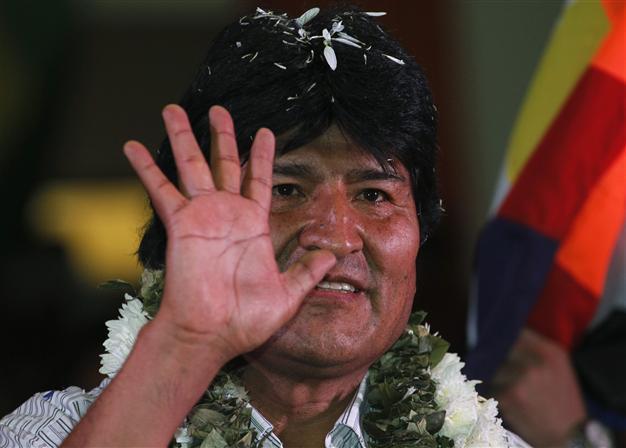Latin leaders sides with Morales on Snowden saga
COCHABAMBA, Bolivia

Bolivia's President Evo Morales. REUTERS Photo
South America’s leftist leaders gathered July 4 to rally behind the Bolivian president after his presidential plane was rerouted amid suspicions that U.S. leaker Edward Snowden was onboard, amid threats to close U.S. embassy in La Paz.
The summit in Cochabamba, Bolivia, where Morales began his political career as a leader of coca leaf farmers, is aimed at expressing outrage over his “virtual kidnapping” and the U.S. pressure they believe spurred it. In a show of support, Presidents Nicolas Maduro of Venezuela, Cristina Kirchner of Argentina, Rafael Correa of Ecuador, Jose Mujica of Uruguay and Desi Bouterse of Suriname met with Morales.
“Europe broke all the rules of the game,” Maduro said shortly after arriving at the Cochabamba airport.
“We’re here to tell President Evo Morales that he can count on us. Whoever picks a fight with Bolivia, picks a fight with Venezuela.” Ecuadorean President Rafael Correa said earlier that if any country had denied airspace to a U.S. or European president, it “probably would’ve been grounds for war.”
Despite the rhetoric, no Latin American country has offered asylum yet to Snowden, who is wanted by Washington for disclosure of intelligence secrets. Two radical leftist governments, Venezuela and Cuba, are in a cautious rapprochement with the United States that would be jeopardized if they gave him sanctuary.
Bolivia said Morales was returning from Moscow on July 2 when France and Portugal abruptly banned his plane from entering their airspace, and it was forced to land in Vienna. Austrian officials said they inspected his plane there, but Bolivia’s defense minister denied this. This unusual treatment of a presidential plane upset leaders in Latin America.
Still, only the presidents of Ecuador, Venezuela, Argentina, Uruguay and Suriname agreed to join Morales at the meeting. Noticeably absent was the president of regional heavyweight Brazil, Dilma Rousseff, who sent her international affairs adviser and a deputy foreign minister to the meeting. The presidents and foreign ministers of Chile, Peru and Colombia, which have good relations with the United States, also stayed away.
Evo Morales, who has suggested the United States pressured European nations to deny him their airspace, warned he would “study, if necessary, closing the U.S. embassy in Bolivia.” “We don’t need a U.S. embassy in Bolivia,” he said. “My hand would not shake to close the U.S. embassy. We have dignity, sovereignty. Without the United States, we are better politically, democratically.”
Meanwhile, Moscow also has made clear that Snowden is an increasingly unwelcome guest because the longer he stays, the greater the risk of the diplomatic standoff causing lasting damage to relations with Washington.
“He needs to choose a place to go,” Deputy Foreign Minister Sergei Ryabkov said. “As of this moment, we do not have a formal application from Mr. Snowden asking for asylum in the Russian Federation.” He told Itar-Tass news agency separately that Russia “cannot solve anything for him” and the situation should now be resolved “one way or the other.” His remarks echoed comments by President Vladimir Putin, who has urged Snowden to leave as soon as he can.
